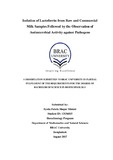Isolation of Lactoferrin from raw and commercial milk samples followed by the observation of antimicrobial activity against Pathogens

View/
Date
2017-08Publisher
BRAC UniversityAuthor
Mimmi, Syeda Fahria HoqueMetadata
Show full item recordAbstract
Lf is a multifunctional glycoprotein with 80 kDa size found in the milk of most mammals. In addition to its well-known role of binding iron, Lf carries many important biological functions, including the promotion of cell proliferation and differentiation, and as an anti-bacterial, anti-viral, and anti-parasitic protein. Milk is the highest quality source of well-balanced nutrients and also displays a range of biological activities that affects digestion, metabolic responses to absorbed nutrients, growth & development of specific organs, and resistance to disease. The purpose of this study is to isolate Lf from different milk samples like raw and commercial milk samples and observe the antimicrobial activity of them. Along with this, the quantity of Lf was differentiated between raw and commercial milk samples. Firstly, Lf was extracted from both raw and commercial milk by acid-base adjustments. Then the concentration of isolated Lf protein was measured by NanoDrop technology and the quantities were compared between the raw and commercial ones. Finally, Lf was identified by SDS-PAGE where 5 bands of Lf were observed among eleven samples. After that, all the samples were tested for their antimicrobial activity against 18 pathogens collected from laboratory stocks. Well diffusion method was used to conduct this test. Lf containing samples showed ZOI against some of the pathogens but some other samples those do not contain Lf also gave ZOI against some of the pathogens. The reason could be, though they do not contain Lf but they contain such proteins that can reduce the microbial growth. All these results are collected and discussed in this study. The raw milk contain higher quantity of Lf than the commercial milk and Lf showed effective results against pathogens that can cause infectious disease in human body. This study suggested that Lf can be used as the potential alternative of antibiotics for many diseases and also can be used to reduce microbial deterioration in food and feed industry.
